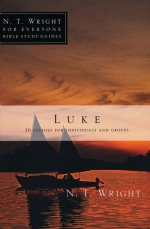$9.99
If you are already a Laridian customer, log in above and we can tell you if you own this product.
Preview Book
Preview the table of contents and a limited selection of text from this book.
 N.T. Wright for Everyone Bible Study: Luke
N.T. Wright for Everyone Bible Study: Luke

N.T. Wright for Everyone Bible Study: Luke
$9.99
Buy It Once, Use It On These Platforms
About this Series
The widely respected pastor and New Testament scholar, N. T. Wright, walks you book by book through the entire New Testament in this series. Perfect for group use or daily personal reflection, these studies use the popular inductive method combined with Wright's thoughtful insights to bring contemporary application of Scripture to life.
About this Volume
Luke was an educated and cultured man, the first of real historian to write about Jesus. He places Jesus at the heart of the first century Jewish and Roman worlds into which the Christian gospel exploded. What Jesus said, what he did and what happened to him has changed the course of history. In these twenty-six studies is the opportunity to delve into the message that Luke wanted to pass on as clearly and accurately as possible.
This volume also available as part of a money-saving bundle.
Features
- Includes suggestions for individual and group study (with leader's guide)
- Features the popular inductive Bible study method with notes and comments from a world-renowned New Testament scholar
- Designed specifically for lay people to facilitate contemporary application of Scripture
From the Preface
Imagine a village in ancient Palestine. They didn't have printed books or newspapers, television or radio. They had official storytellers. Some great event would happen: an earthquake, a battle or the visit of an emperor. Within a day or two the story would be told all round the village, and would settle into a regular form. Everyone would know the story, but some of the better storytellers in the village would be recognized by the others as the right people to tell it.
And that's what they'd do. They wouldn't change the story or modify it; if they did, people would notice and set them straight. So when Luke went round the villages of Palestine and Syria in the second half of the first century, listening to the stories told by the accredited storytellers--"the stewards of the word," as he calls them--he would know he was in touch with solid, reliable evidence that went right back to the early events. Plato had said, five hundred years earlier, that there was a danger in writing things down; human memories, he thought, were the best way to get things right and pass them on. In the century after Luke, one of the great Christian teachers declared that he preferred living testimony to writings. You can't tell where a book has come from, but you can look witnesses in the eye, and use your judgment about whether to trust them.
So, why is Luke writing it all down now? And who was Luke anyway? We actually don't know for certain who the author of this book was, but we call him "Luke" because that's who the church, from very early on, said had written this Gospel and the Acts of the Apostles too. He may well have been the Luke whom Paul mentions as his companion (Col 4:14; Phlm 24; 2Ti 4:11). He could have been writing any time between A.D. 50 and 90. A fair guess is that the author is Luke, one of Paul's companions, and that he was writing in the 60s or 70s. Why write such a book now?
The main reason is that the message about Jesus has spread far and wide, way beyond the original communities in the regions Jesus himself visited. Peter, Paul and other missionaries had carried the message in all directions, and doubtless there were garbled, muddled and misleading reports circulating about who exactly Jesus was, what he did and said, and what had happened to him. Luke knows of other writings that have begun the task of putting it down on paper, but he has a wider audience in mind, an educated, intelligent, enquiring public.
A further reason, if indeed Luke is writing in the late 60s and 70s, would be the horrendous war that was raging in Palestine at the time. The Jews rebelled against the occupying Roman forces in 66, until finally, after a long siege, Jerusalem was destroyed in 70. The result was that many towns and villages where Jesus had been seen and known were decimated. Not only was the older generation dying out, but communities that had witnessed Jesus' activities were being dispersed or destroyed. The stories, which depended for transmission on a peaceful, stable society, were in danger of dying out. Unless steps were taken to write them down, the message would not be passed on to the next generation. And since Luke, like all the early Christians, believed that the things that had actually happened (what we would call the historical facts) had changed the course of the world, it was vital that they be presented as clearly and unambiguously as possible.
Luke thus constructs a grand doorway into his Gospel. He invites us to come in and make ourselves at home. Here we will find security, a solid basis for lasting faith.
About the Author(s)
N. T. Wright, formerly bishop of Durham in England, is research professor of New Testament and early Christianity at the University of St. Andrews in Scotland. He was formerly canon theologian of Westminster Abbey and dean of Lichfield Cathedral. He also taught New Testament studies for twenty years at Cambridge, McGill and Oxford Universities. Wright's full-scale works The New Testament and the People of God, Jesus and the Victory of God and The Resurrection of the Son of God are part of a projected six-volume series titled Christian Origins and the Question of God. Among his many other published works are Surprised by Hope and Simply Christian.
System Requirements
Installed size (unless otherwise indicated): Approximately 198.125 KB. iPhone, iPad, and iPod touch Requires iPhone, iPod touch, or iPad running latest version of iOS. Download size: 198.125 KB. Android Requires Android OS 4.4 or later. Download size: 198.125 KB. Windows Phone Requires Windows Phone 7.5 or later. Download size: 198.125 KB. Windows Store Requires Windows 8, 10, 11 or later. Download size: 198.125 KB. Windows Desktop Requires Windows 2000, XP, Vista, Windows 7, 8, 10, 11 or later. Download size: 1.125 MB. Mac OS Requires macOS 10.13 or later. Download size: 198.125 KB.
The Fine Print
Copyright © 2010-2024 by Laridian, Inc. All Rights Reserved.
Laridian and PocketBible are registered trademarks of Laridian, Inc. DailyReader, MyBible, Memorize!, PrayerPartner, eTract, BookBuilder, VerseLinker, iPocketBible, DocAnalyzer, Change the way you look at the Bible, and The Bible. Anywhere. are trademarks of Laridian, Inc. Other marks are the property of their respective owners.
About You
- You are viewing the mobile version of our website.
- You are not logged in.
- Your IP Address: 3.20.238.187
- Site IP Address: 69.167.186.191
Social Media
Like and follow us on Facebook.
Follow us on MeWe.
Stay Informed
We announce new products via email. If you ask to be removed from any of our mailings, you will not receive these notifications. If your email address changes, make sure you change it here, too.
From time to time we post things on our blog, on MeWe, and on Facebook.
The Fine Print
Copyright © 2010-2024 by Laridian, Inc. All Rights Reserved.
Laridian, PocketBible, and MyBible are registered trademarks of Laridian, Inc. DailyReader, Memorize!, PrayerPartner, eTract, BookBuilder, VerseLinker, iPocketBible, DocAnalyzer, Change the way you look at the Bible, and The Bible. Anywhere. are trademarks of Laridian, Inc. Other marks are the property of their respective owners.
Products by Platform
Bible Reader Software
- PocketBible for iPhone/iPad
- PocketBible for macOS
- PocketBible for Android
- PocketBible for Windows Store
- PocketBible for Windows Phone
- PocketBible for Windows
BookBuilder Software
- BookBuilder for Windows
- BookBuilder Pro for Windows
- BookBuilder for macOS
- BookBuilder Pro for macOS
- Self-Publishing Info
About Laridian
Products by Type
Your Account
- You are not logged in.
- Your IP Address: 3.20.238.187
- Site IP Address: 69.167.186.191
- Your Account Information
- Your Order History
- Your Downloads
- Your Notes, Highlights, and Bookmarks
- Your BookBuilder Books
- Your Shopping Cart
- Register Purchase from a Store
Best Ways to Get Help
You can get the fastest help by helping yourself.
- Make sure you download and install the PocketBible app that is required to read the Bibles or books you bought
- Read the confirmation email we send you when you make a purchase
- Read the help that's built into each of our products
- Look through our Frequently Asked Questions
- Submit a Support Ticket
- Email us at support@laridian.com









